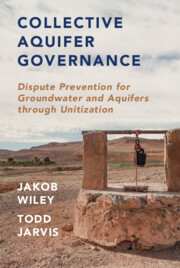Book contents
- Collective Aquifer Governance
- Collective Aquifer Governance
- Copyright page
- Contents
- Figures
- Tables
- Acknowledgments
- Abbreviations
- 1 Introduction
- 2 Overview of the History of Collective Action on Subsurface Resources
- 3 Governance of Groundwater and Aquifers
- 4 Unitization and Collective Aquifer Governance Agreements
- 5 Determination and Redetermination
- 6 The Role of the Expert
- 7 The Next Transresource
- 8 Pore Spaces
- 9 Application to an Aquifer System
- 10 Getting Around Agreeing to Disagree
- 11 Serious Gaming and Unitization
- 12 Conclusions and Recommendations for Future Research
- Appendix Model Collective Aquifer Governance Agreement
- Glossary
- Bibliography
- Index
12 - Conclusions and Recommendations for Future Research
Published online by Cambridge University Press: 20 January 2022
- Collective Aquifer Governance
- Collective Aquifer Governance
- Copyright page
- Contents
- Figures
- Tables
- Acknowledgments
- Abbreviations
- 1 Introduction
- 2 Overview of the History of Collective Action on Subsurface Resources
- 3 Governance of Groundwater and Aquifers
- 4 Unitization and Collective Aquifer Governance Agreements
- 5 Determination and Redetermination
- 6 The Role of the Expert
- 7 The Next Transresource
- 8 Pore Spaces
- 9 Application to an Aquifer System
- 10 Getting Around Agreeing to Disagree
- 11 Serious Gaming and Unitization
- 12 Conclusions and Recommendations for Future Research
- Appendix Model Collective Aquifer Governance Agreement
- Glossary
- Bibliography
- Index
Summary
The myths of aquifer science have been mostly dispelled, but the mysticism of governance still lurks behind current approaches to sustainable groundwater use. Aquifers are combinations of both public and private rights, physically bound, and must be treated as elements in a complete aquifer system. The examples described in this book show that progress has been made to move from groundwater management to groundwater governance, but in only some cases has governance reached the aquifer. Unitization of oil and gas fields provides a valuable analogy to aquifers, showing an approach that bridges the science with the social and legal context, forming a negotiated, often voluntary governance system. As shown in this book, the unitization contract system could potentially be applied to aquifers across the United States and abroad.
- Type
- Chapter
- Information
- Collective Aquifer GovernanceDispute Prevention for Groundwater and Aquifers through Unitization, pp. 162 - 164Publisher: Cambridge University PressPrint publication year: 2022

